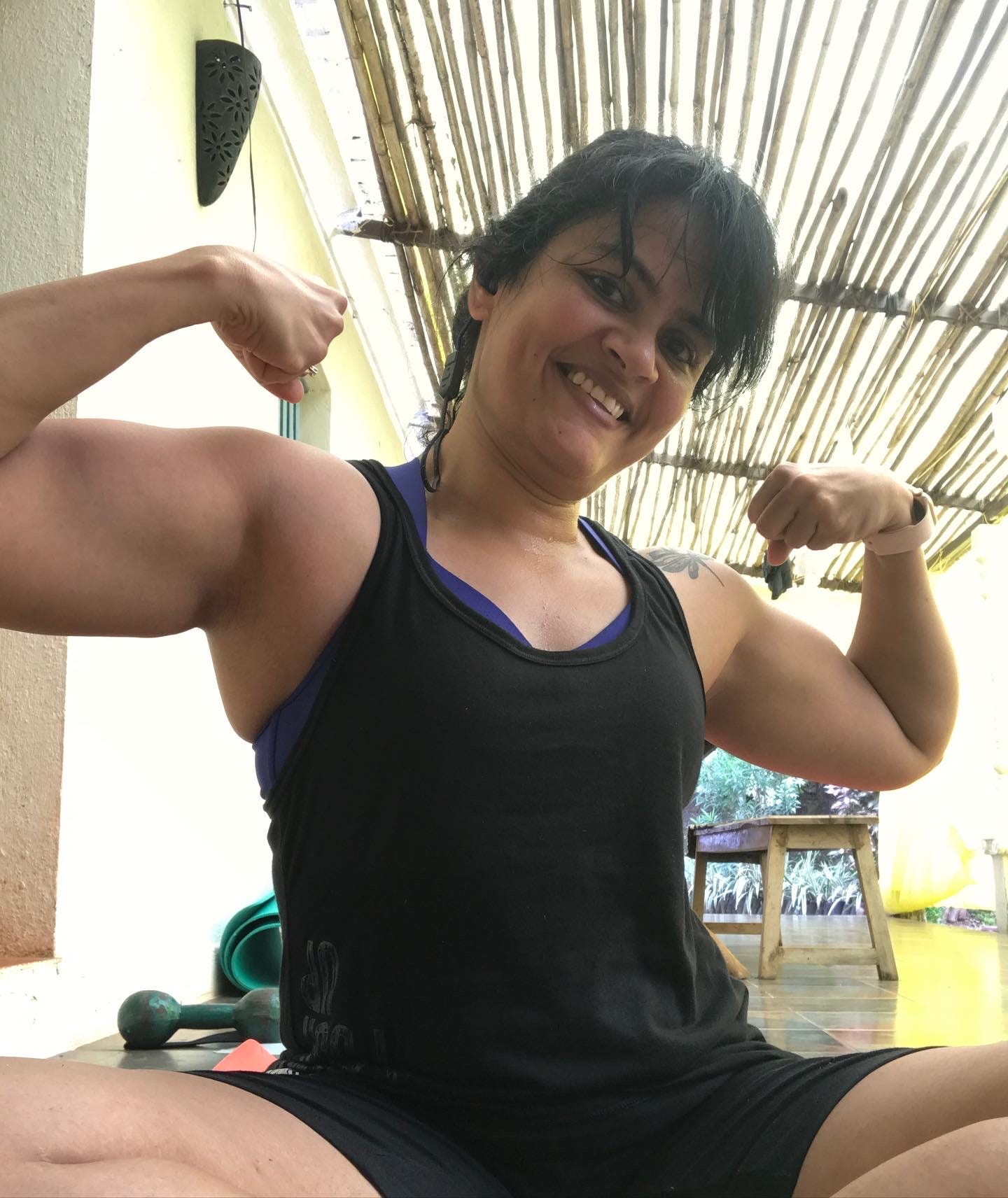Body shaming women is our favourite national pastime
Thunder thighs, moustaches, and flour needs
Hello ji,
Let us begin this time with a personal story of yours truly. This is one of my earliest memories.
I was probably 5 or 6 years old and was playing by the side of the street outside our house. The street was empty and I was lost in the intricacies of whatever game 6-year-olds play by themselves. Suddenly, a man on a bicycle went past me, shouting, "Kaunsi chakki ka atta khaati ho?"
(Literally: What mill does your flour come from?
Colloquially: Look how fat you are.)
By the time I looked up, he was gone. I remember actually checking left and right to see if there was someone else he had addressed that remark to. I had never heard the expression before and it sounded like an odd thing for an adult to say to a child.
I eventually went back to play, vaguely concerned about that nice uncle’s unmet flour needs.
I did not know then that I had just had my first brush with what was going to be a long and illustrious career of being body shamed.
Bhavna loves dancing. Growing up, dancing was a form of self-expression for her, a way to feel unbridled joy.
A classmate once saw her dance and said, "Arey, ye moti toh bahut achha dance karti hai!" (Oh, this fatso actually dances well!)
Bhavna says the comment tainted something she truly loved and was an assault on her self-esteem as a young girl and she did not dance for years after that.
As a young girl, Sukanya remembers friends, relatives, and even strangers regularly commenting on her dark skin. "Who will marry such a dark girl?" was a popular running conversation topic at family gatherings.
She would be especially heartbroken when her mother and grandmother - both strong women she deeply loved and admired - would comment on the colour of her skin and compare her with her fair-skinned younger sister.
"I still remember my mom denying to buy me a bright coloured dress that I really loved as a little girl because she thought it would look glaring on my skin. I was sad and hurt to let go of the dress and replace it with a dull brown coloured one that she preferred for me. Constant reminders like this would make me feel like less of a person."
Neha says many of her childhood experiences led to a slow build-up in her mind of all the ‘defects’ she had. Her mother would worry about how much body hair she had. Aunties would give her mother condolences and home remedies in hushed whispers. At school, boys would make fun of her for ‘having a moustache’.
Sick of it all, she began waxing at a very young age. Even there, the aghast comments made by the salon staff about her hair growth would hurt her more than the pain of ripping her hair off with hot molten wax.
“All of this has perpetuated a lifelong battle with shame around my unwaxed body.”
Sukhada used to play cricket at college-level. As a sportswoman, she preferred wearing comfortable clothes that allowed her to play her best game. This often led to unsolicited advice from friends, asking her to wear 'more feminine clothes' to hide her ‘thunder thighs’. Even off-the-field, people would suggest she should trade in her favourite t-shirts and jeans for long kurtis and tunics to look 'more like a girl'.
Sukhada says the comments made her even more adamant not to dress the way these people wanted her to. In fact, she began to discount girls who wore 'girly' clothes as shallow and frivolous.
“It wasn't until much later in life that I began to appreciate that - contrary to what people will have you believe - femininity comes in all sizes, colours, and clothes.”
Aparna is a senior sales professional who helps large organizations grow their business further.
One day, after addressing a company's top management at a successful sales meeting, she walked out of the boardroom with one of the CXOs. As they were exchanging pleasantries on the way out, he turned to her and said, "So, you've put on a few kilos, it seems?"
The comment left her not only furious but also deeply disappointed.
"If the head of a prominent digital brand - a highly educated man who has undoubtedly attended plenty of sensitivity trainings at work - goes around making such off-handed remarks about women's bodies, what hope is there for the rest?"
Two months after her son was born through a C-section, Radhika realized she was suffering from post-partum depression. Still recovering mentally and physically after the surgery, losing the pregnancy weight was the last thing on her mind. Her son was a healthy but skinny-looking baby and the depression made her constantly question herself as a mother - including whether her body was generating enough breast milk for her son.
After weeks of suffering in solitude, she began her journey of healing by getting out of the house with her baby and taking a short walk around the block every day.
“One day, a random stranger stopped me on my walk and said, ‘Oh saara khana tum hi kha rahi ho? Bacche ko kuch nahi khila rahi ho?’ (Oh, so you are eating all the food? Not feeding your baby anything?)”
She cried every day for weeks afterward, thinking about his comment, and stopped going on her walks altogether.
It is not that body shaming happens only to women. Men can go through it as well. Whether for their size, their hair or their height - men can often find themselves at the receiving end of such harsh comments too.
Among women, however, it is a universal experience.
You would be hard-pressed to find any woman who has never been called too fat, too thin, too dark, too pale, too short, too tall, too heavy-breasted, too flat-chested, too pimply, too hairy, or a million other permutations and combinations of failures to meet some unattainable beauty standards.
Think of the most attractive female celebrity you can. Now google her name with the expression “body shamed” and I assure you that there would be a corner of the internet where you would find someone critiquing her body.
Let us stick with Radhika a bit longer.
All her life, she had been fat-shamed when she put on weight (stop eating so much!), and skinny-shamed when she lost it (aren't you eating at all?). Today, Radhika is a FitLife coach. After decades of being uncomfortable in her own body, and suffering from an eating disorder, she has now turned the crusade against body shaming into a career.
“Body shamers operate from a very deep sense of insecurity. They might never acknowledge it even to themselves, but a part of them feels threatened when they see someone content and happy as they are. They belittle others to feel good about themselves.”
If you call such people out, the retort is often "I was only trying to help." She says, however, that if it makes the other person feel small and humiliated, then no matter the intent, it is body shaming.
In her personal fitness journey, Radhika recently achieved the milestone of dead-lifting 100kgs of weight. If you are thinking "at least now people will stop commenting on her body", think again.
For Radhika, fat-shaming has now turned into fit-shaming. An uncle in her family recently told her, "If you become too strong, it will make your husband insecure. Trust me. I am a man. I know how men think."
Radhika says she has realized now that absolutely no one can meet the world's impossible standards for women's bodies, and the realization has set her free. Besides, she adds, her husband is her biggest champion, and loves to brag about her fitness.
"His only complaint is: I look at my muscles more lovingly than I look at him!"
A quick circle back to the other leading ladies of this week:
Bhavna sponsors the education of her domestic help's children.
In a past life as a journalist, Aparna helped generate awareness about a street calligraphy artist from Vidarbha. His letter to her, telling her that she changed his life, is her most prized possession.
Sukhada regularly runs crowdfunding campaigns to raise finances for people in abject poverty and immediate need.
Neha is one of the women behind the campaign that led to changing the brand 'Fair and Lovely' to 'Glow and Lovely' - a small but first step in the direction of body positivity for a brand that has made generations of dark-skinned girls feel less-than.
Sukanya went on to adopt a baby girl, who was born to an underage mother and abandoned at an orphanage. Her daughter now has a home full of love and acceptance, and a strong mother who is determined to raise a stronger daughter.
Just in case you were wondering if the women whose stories you read today are beautiful.
Recommendation of the Week
For those interested in body positivity, I recommend the Fat. So? podcast where Ameya and Pallavi discuss being fat - the pain, the joy, the learning, the dark humor, and the silver lining. Tune in alternate Sunday evenings for new episodes.
Have a great weekend, you!
Unless you have body-shamed someone recently, in which case, I hope you find a good place to meet your flour needs.
Mahima
This newsletter comes to you free of cost. But that does not mean that it costs nothing.
Womaning in India is a physical, mental, and emotional labour of love. If you appreciate the work I am doing with it, you can show me your love by buying me a coffee.







A lot of times, things actually happen in much more cruel ways to girls and women......
Fantastic piece Mahima. Great narrative. You begin with a personal story - lace it with sliced of self detracting humor and then take us deeper into tougher stories of other women. And nice check at the end in italics- reminding the reader that all these women are also beautiful :).
Your style makes it an easy read yet you do not hold back laying hard punches!